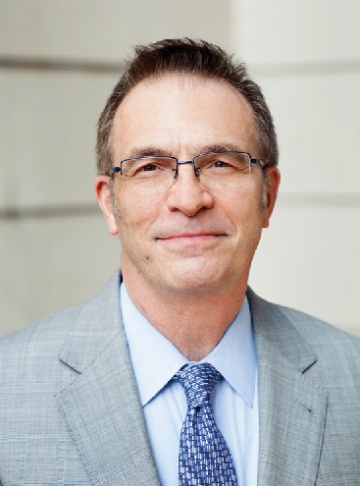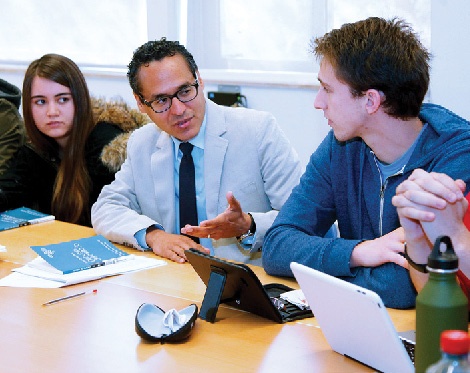Columbia College | Columbia University in the City of New York
The Need to Preserve Human Values
In this issue, Robert Y. Shapiro, the Wallace S. Sayre Professor of Government, writes about a presidential election when “virtually every major issue divided the parties” and “political emotions were running high.” Shapiro, whose research focuses on partisan polarization, ideological politics, public opinion and policymaking, is describing 2008, the year Barack Obama ’83 was elected. But any of us would be excused for assuming that it is 2016 to which his assessment refers. Indeed, as Shapiro says, the 2016 election “was the most conflict-ridden and personal presidential campaign of modern times.”

MATTHEW SEPTIMUS
At Columbia College, we provide students with tools to analyze and interpret the present using knowledge of the past. Our Core Curriculum, the common experience of a College education, gives students an understanding of how society has grappled with the fundamental issues of human existence — our relationships, our obligations, our responsibilities, our rights — and how society has developed and refined systems that honor rights and recognize responsibilities. The goal is not only to transfer knowledge, but also to raise fundamental questions about human existence, to ask what we know and how we know it and to consider all opinions, all ideas and all possibilities.
This is why, especially with all of the discord and polarization in the country and the world today, the Core is so important. It is vital that we engage students with perspectives and ideas that are different from their own, perspectives and ideas they may not be comfortable with, perspectives and ideas about which they may have been unaware. It is in this way that students learn about themselves, learn about others and develop as human beings and as citizens of the world. President Lee C. Bollinger reaffirmed this in November at the College’s annual Alexander Hamilton Award Dinner when he mandated that we should “teach the Core Curriculum with more fervor and passion than it has ever been taught before.”
For nearly 100 years, the Core has given College students more than an education — it has given them a foundation in ethics, morals and citizenship. That has not, and will not, change. Indeed, one of our goals with Core to Commencement, the campaign we launched last year to build the greatest undergraduate experience, is to endow this foundational program, to enhance it, to enrich it, to ensure the continuing vitality of this one experience shared by all students and alumni.

Roosevelt Montás ’95, GSAS’04, director of the Center for the Core Curriculum, with students at Adolfo Ibañez University
in Santiago.
El Mercurio
Today I am proud that we are not only teaching the Core with fervor and passion, but also that we are encouraging others to do so. For the past few summers, Roosevelt Montás ’95, GSAS’04, director of the Center for the Core Curriculum, has been meeting with faculty members from institutions around the world as part of the “Tradition and Innovation” seminar, an intense reading and discussion of texts from the Core at Columbia and at Chicago — organized in partnership with the Association for Core Texts and Courses and funded by the Teagle Foundation — which gives faculty leaders a core-text seminar experience and helps them develop core curricula to implement at their own institutions.
This past year, Montás and our Center for the Core Curriculum also helped Adolfo Ibañez Univesity in Santiago launch its own Core Curriculum, which began this year with a Spanish-language version of Contemporary Civilization. We also recently partnered with Hostos Community College in the South Bronx to launch a Core initiative, which included a revision of its first-year English requirement along the lines of our Core. As part of this initiative, Columbia faculty have conducted workshops for faculty at Hostos on teaching Core texts and Hostos faculty have attended some of our Core faculty meetings.
In a letter to the University community in late fall, Provost John Coatsworth reiterated “how important it is to protect all who study and teach in our community and to defend the institution and the values it embodies.” This includes not only our commitment to helping students acquire knowledge and develop understanding and insight, but also our unwavering commitment to tolerance, inclusion and diversity. Civil discourse remains of the utmost importance within our intellectual community, and freedom of speech and expression are paramount, even when we do not agree.
Our role is to continue to provide a place for conversations about individual rights, benefits and responsibilities; about how we express that we value one another; and about the society we create based on our fundamental values. Our role is to teach students to keep an open mind, to be respectful of differences, to approach all they do with a thoughtfulness about whom they affect and how, and to encourage them to learn, grow and contribute to building a community, a nation and a world where the fundamental human values we espouse are ever more evident.

James J. Valentini
Dean
Issue Contents
Published three times a year by Columbia College for alumni, students, faculty, parents and friends.
Columbia Alumni Center
622 W. 113th St., MC 4530, 6th Fl.
New York, NY 10025
212-851-7852
cct@columbia.edu
Columbia Alumni Center
622 W. 113th St., MC 4530, 4th Fl.
New York, NY 10025
212-851-7488
ccalumni@columbia.edu

